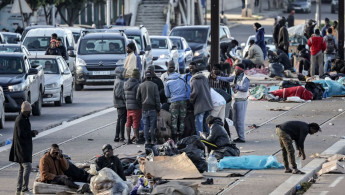In Casablanca, migrants battle cold and racism, dream of European asylum
Three years ago, Amari left Guinea to go to Europe. After surviving the desert road, today he lies on the cold ground of Casablanca's tram railway, a mere three hundred kilometres from the Mediterranean.
Dozens of Sub-Saharan migrants like Amari use the unfinished tram rails as a temporary shelter until they find a means to Melilla or Ceuta to cross the last land borders with Europe.
"I tried five times [crossing from Melilla], but I did not make it," Amari, 22, said to The New Arab.
Like other migrants interviewed in this report, Amari's name has been changed.
It's 8 am, and the temperature has reached 6 degrees Celsius, but it feels freezing, mainly if you are dressed in light-patched clothes and sleeping on cement.
"It is dehumanising to sleep on the ground, hungry most of the time, and looked down at like you are some alien," Yuusuf, a 25-year-old Malian migrant, told TNA.
The migrant camp is set on the edge of the coastal port city of 4.2 million people because of its proximity to Ouled Ziyan bus station, a major transport hub.
The station toilets are the only place migrants wash themselves and their clothes. Sometimes, they are denied access to 'not disturb travellers,' said migrants.
Meanwhile, the Catholic charity Caritas provides migrants with medicine and basic healthcare.
It is still morning, several of the camp's residents cook in a makeshift kitchen, while others kill time listening to music, reminiscing about their homelands or vibing with Moroccan rap that they say helped them learn some Moroccan Darija words. Even those who do not understand Darija, have developed recognition of the racist slang passengers or angry drivers yell at them from time to time.
"Many people are nice to us, but sometimes passengers mock us, tell us that we are dirty or we are scaring children," Yuusuf said.
Several local media have voiced a similar anti-migrant tone, standing with authorities' efforts to evict migrants from the site.
"End clandestine immigration!" read a recent headline in the weekly newspaper Maroc Hebdo, calling it "a social, security and political problem that the state is struggling to manage".
Maroc Hebdo récidive. Recherche du sensationnalisme, avec un traitement éditorial, encore une fois, alarmiste au lieu d'être factuel, contextualisé. #Migration #mediamigration pic.twitter.com/ivQbC9iD1Z
— Salaheddine Lemaizi (@LemaizO) January 20, 2023
This month, six migrants were arrested during a police operation to evict the camp, with migrants confronting authorities with stones to preserve their shelter.
However, many residents see the migrants as one of them: dreamers of Europe. "They are just like us. They want a better life. They want to go to Europe. We all want that here," a Moroccan vendor remarked to TNA.
A few metres away from the tram camp, dozens of migrants with similar dreams and struggles shelter in an abandoned school.
Most of them are Sudanese, the younger one is twelve years old and has already tried to cross the border from Melilla six times in one year.
"In my country, there's war. My family gave me some money and told me to leave," said Omar, a Sudanese migrant.
Omar fled South Sudan alone and travelled through Chad, Niger and Algeria. He dreams about studying in France.
Unlike Omar, who is still young and optimistic about the European dream, many other migrants have started losing hope in leaving the Moroccan limbo one day.
Ahmed, who has tried four times to cross the Melilla border, says he is tired but he has little to lose.
"They treat us worse than animals. Like we are some commodities. They negotiate our lives' prices shamelessly," Ahmed said.
Ahmed, who arrived in Morocco a year ago, said he knew some of the victims of the Melilla massacre. His voice still shakes in anger and melancholy as he speaks of his late friends.
"They did not deserve to die that way. No one deserves that," he added.
On 24 June 2022, around 2,000 migrants attempted to cross the Barrio Chino fence, one of many border passages separating Morocco's Nador and the Spanish-controlled enclave of Melilla.
Moroccan authorities said at least 23 people were killed due to suffocation, while others died after falling from the fence. NGOs say the death toll is most likely higher.
In July, Morocco's Association of Human Rights (AMDH), an independent organisation, said migrants were actively attacked and killed by Moroccan and Spanish forces. BBC and El Pais investigations confirmed AMDH's report.
AMDH argues that the Melilla massacre was a "token of love" from Rabat to its new friend Madrid.
The massacre occurred shortly after Rabat and Madrid ended their year-long dispute, vowing 'stronger' cooperation on migration.
The diplomatic dispute ended after Madrid decided in March to walk away from its decades-long policy of neutrality on Western Sahara and backed Morocco's autonomy plan in the disputed territory.
Many commentators say that Morocco has exploited Melilla and Ceuta in recent years as diplomatic leverage to pressure European states to back Rabat's sovereignty over Western Sahara.
Rabat does not address the accusations.
Last year, Moroccan authorities arrested more than 32,000 migrants and 566 individuals suspected of being involved in human trafficking networks, according to official figures.
The fight against irregular migration is a key issue in the partnership between Morocco and the European Union. Rabat is set to receive around 500 million in European funds to control borders.





 Follow the Middle East's top stories in English at The New Arab on Google News
Follow the Middle East's top stories in English at The New Arab on Google News


